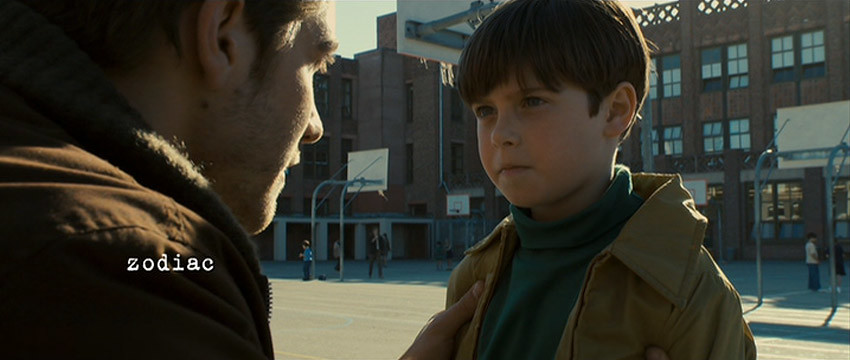
Definitely watched for research, as I'm about to try and tell a very procedural, very visually dry short story about puzzle solving and code-breaking, but man, Zodiac is a film that never disappoints. It's not that the case isn't interesting, because it obviously and totally is, but if I were to sit and tell you how much data this film needs to work, and how many years and protagonists and loose ends and paperwork you were going to have to sit through -- not to mention revisiting all that paperwork years-of-movie-time and hours-of-screen-time later -- you would probably tell me it sounds like a boring (or again, at least dry) documentary and not very dramatic. And yet, you're not bored for even a minute watching it.
I think one of the tricks that keeps so much information working -- aside from a stellar cast of more character actors than you can shake a stick at -- is the economy of the storytelling. Entire locations, scenes, weeks of someone's life take place in a single shot, lasting as few as 5 seconds of screentime, and in each scene people are doing things (the reporter team of Avery-Graysmith seem to be always drinking or discussing drinking; the cop team of Armstrong-Toschi seem to be always eating or discussing food -- am I reading too deeply to suggest that they are ingesting clues and data in totally different ways, and that each needs the other to be fruitful and survive/solve the case? in fact when Graysmith starts working with Toschi he repeatedly has to buy him meals in order to gain his cooperation and trust), but the entire scene, location and everything, is over in three or four lines of dialogue, tops. Then we move on to the next clue. There's very little to distract you (that isn't meant to distract you), but at the same time the characters and world all feel lived in, inhabited. Many moments end just as a character-related moment is about to begin. For example, at the theater, after Graysmith awkwardly fails to connect with Toschi, we slowly fade out while Melanie is just walking into frame and up to Graysmith. We get a real sense that the character drama is unfolding just outside the bounds of what we're being shown, which keeps the story from feeling dry and bare-bones, keeps the sense of a reality and a timeline while letting us focus on the meat of the story, on the mystery and the clues. Partner shorthand and quirky details (animal crackers; Aqua Velvas) keep the banter from being stale. Brilliant actors breathe life into their necessarily-few scenes. In short, everything works just right in this film, moves just exactly as it would have to for Zodiac not to be a boring info-dump of a movie.
On a more personal, less critical-eye note, it's frustrating that Fincher went from top of his game (The Game, Seven, Fight Club, The Panic Room, Zodiac) to Benjamin Button, an uncanny-valley point-by-point rip off of the already terrible Forrest Grump storyline that left me not just cold, but itchy to get out of a theater and never deal with it again. Rewatching this, it's good enough that I'm almost tempted to try Button one more time... but even the thought of it is unpleasant, so I guess that probably won't happen for a long while. Very excited for The Social Network, though. That feels like a very Zodiac story waiting to unfold.

1 comment:
For as many times as I've watched Zodiac (7 not counting commentary tracks cough), I've never thought about the Avery/Graysmith drinking connection, nor the Toschi/Armstrong food connection. Like the way reporters use facts is a kind of intoxication and the detectives need more sustenance. I'm glad you brought up this angle! Whether or not it was an intentional choice by Fincher or Vanderbilt, it's definitely fascinating.
Post a Comment